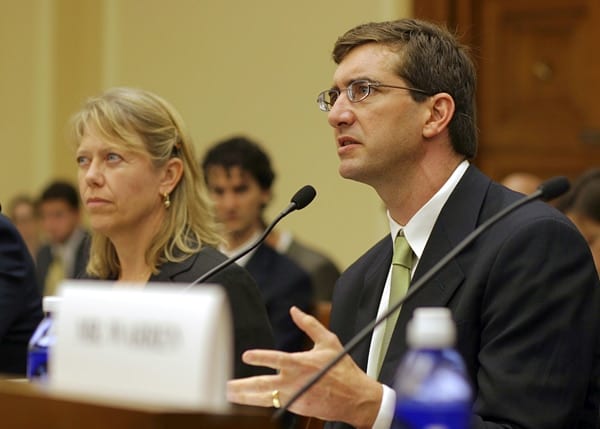“Know thy audience. Know thyself. Know thy stuff.”
We offer this quote by the late Dr. Steve Schneider in COMPASS’ communication trainings as a guiding principle for scientists preparing to share their science with the wider world. Schneider, one of the first climate scientists to work as an active adviser to policymakers in the White House and federal agencies, passionately believed that scientists have a social responsibility to communicate what they know and that “staying out of the fray is not taking the high road, it is just passing the buck.” His messages to scientists both challenge and inspire.
But there’s a lot of nuance in learning how to communicate effectively with policymakers. I found myself thinking more deeply about Schneider’s first instruction, “Know thy audience,” as I prepared, earlier this month, to lead a COMPASS communication and policy training for Switzer Environmental Fellows at the Golden Gate National Recreation Area.
On the flight from Washington, D.C. to San Francisco, I revisited (for easily the fourth time!) the scenario-planning worksheet, which we use to match up participants and policy trainers for mock policy scenarios, struggling to make useful pairings. One signature of COMPASS trainings is our emphasis on the experiential, putting the message box to the test in scenarios that are authentic to what scientists might encounter in the real world.
In policy trainings, we bring in policymakers to share their views from the trenches. At the Switzer training, we benefited from a diverse group of very generous policy trainers. Mark Nechodom, currently the Director of California’s Department of Conservation which oversees fracking and mining activities in the state, also brought deep expertise from his various senior advisory roles to the U.S. Department of Agriculture. John Andrew, the Deputy Assistant Director for the California Department of Water Resources, shared his experiences in helping lead California’s efforts in climate change adaptation planning. Annabelle Kleist offered a legislative perspective, drawn from her tenure as a California Council on Science and Technology fellow working for Assembly Member Brian Nestande. Finally, Guillermo Rodriguez brought a more local San Francisco perspective, tapping into his experience as the Policy & Communications Director for the San Francisco Department of the Environment.
At the three-hour mark of my cross-country journey, I scrutinized my scenario worksheet again. It was a bit like the game of Clue… remember Miss Scarlett, in the parlor, with a rope?
Trying to finesse the right pairings of Switzer Fellows, policy trainers, and scenarios put the “know thy audience” challenge to the test. Should I set up a scenario that matches a Fellow working on climate change impacts on the ocean with a trainer playing the role of Senate staffer whose boss is a well-known climate change denier? Totally realistic, but not easy. What about creating a walk-and-talk opportunity in which a scientist who studies bats needs to capture the attention of the California Director of Conservation as he races from one meeting to the next? Again, realistic, but not easy.
When thrust into these scenario role-playing exercises, workshop participants face the challenge of assimilating a lot of moving parts all at once. They are trying to make sure they hit all of the key elements of their work as laid out in their message boxes, while trying to interpret and respond to the unexpected context that they suddenly find themselves in. Context really matters, as Brooke wrote about earlier this month. People exist in a realm where values, experiences, and personal relationships factor heavily in the calculus of everyday decisions. But how do you assess and calibrate this context to be ready for such encounters?
Though you never know when you might find yourself sitting next to a policymaker in an airport waiting room, most of the time you will have the opportunity to prepare for your meetings. Next to honing your message box, understanding the policy context you are stepping into is the most important preparation you can do.
The policy trainers provided a few key insights to the Fellows about how to approach the “know thy audience” challenge. Collectively, they shared some of the following nuggets:
- Learn the history of the issue. With very few exceptions, most issues that you raise will not be entirely new to policymakers. This means that part of your preparation will require rooting out what has come before. Who is already talking to them about this issue? What are the politics surrounding it? What do you have to offer from your research that adds a new dimension to the conversation? Are you offering a stepwise advance or the potential for a paradigm shift? Know where you fit in the larger landscape.
- Find out who is who. Are you talking to a staffer or the policymaker his/herself? How is the office structured? Do you have the ear of the right person for your issue? If not, is there a strategy you can use in your meeting to help make sure that message gets briefed upward to the most appropriate people?
- Pay attention to social graces and body language. It is crucial to learn to read people, situations, and social signals. Mark Nechodom shared some advice that might seem counterintuitive. Though you might feel tempted to extend the encounter as long as possible, he says, “Always give me an out.” There’s no better way to sink your chances of being taken seriously than if you corner someone at a cocktail party and leave them no delicate way for a graceful escape.
Back at my desk in D.C. last week, I reviewed some of the feedback from the Fellows at the Switzer training. We realize it’s hard to be put on the spot like that, to learn the nuances of your audience on the fly. But hands down, the Fellows identify these role-playing scenarios as one of, if not the, most effective part of the training. We hear this feedback all the time.
While we know that not everyone can run through mock scenarios with policy trainers to prepare for their meetings, the tips above can help you get ready. And don’t forget to take Steve Schneider’s mantra to heart. “Know thy audience. Know thy self. Know thy stuff.” This is perhaps the most important advice to set you up for a successful encounter.



